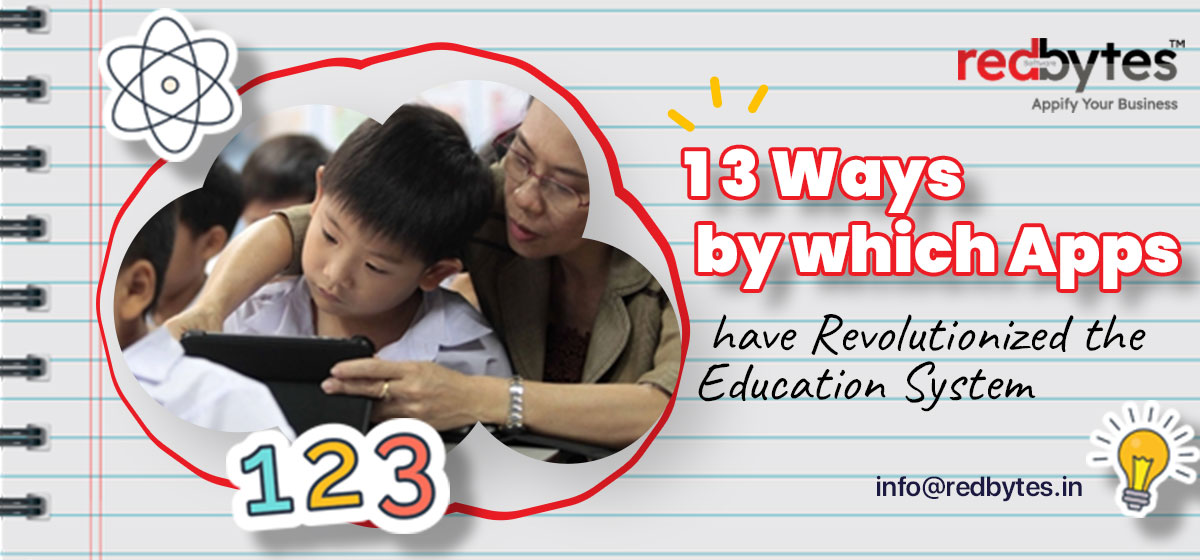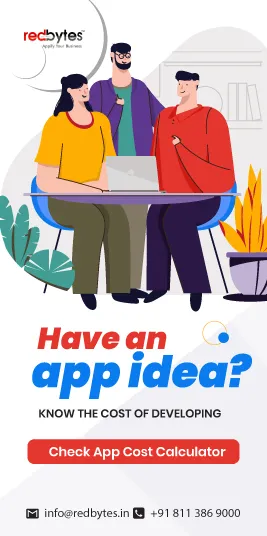Mobile applications have been helping education for some time now. However, COVID-19 has made it much more self-evident. In 2019, we all witnessed the closure of schools and educational institutions amid the COVID-19 pandemic. While educational institutions had no option except to close their doors, students could not access online classes due to the availability of applications. Students could connect, ask questions, write tests, utilize the library, submit assignments, and do nearly all they did when schools were open at the ease of a few clicks.
The biggest benefit of mobile apps is that students can learn from the comfort of their bedroom from anywhere and anytime. Due to the availability of these mobile apps, education has become a continuous process and is not limited to traditional classrooms or what teachers teach.

Additionally, schools and educational institutions can now teach students online, provide e-learning resources, mentor students and keep an eye on each student’s performance with ease. In short, mobile apps have slowly changed the traditional age-old classroom teaching and enabled them to incorporate smart learning.
To sum up the power of mobile apps in education, here are 13 ways mobile apps have revolutionized the education system.
1. Reduces the Cost of Learning
During pre-COVID times, students had to travel to different countries to learn. With the adoption of mobile apps, students can be in Australia, get admission into an educational institution in Canada and attend online classes in the comfort of home. Students no longer have to spend money on traveling, accommodation, and other costs that come with traditional school learning.
In short, mobile apps help students grow, learn creatively, and adapt to digital ways of learning at a low cost.
2. 24×7 Presence
The mobile app is available for students 24×7, helping them learn at their own pace and clear doubts wherever and wherever they want. In a traditional classroom, the timing of classes is limited, and no educational institution can open schools 24×7. The mobile apps facilitate the flexibility to learn, eliminating the stress about time and schedules.
Several mobile apps enable students to connect with teachers personally to resolve their queries. The mobile apps eliminate the stress of students who are not comfortable asking doubts in a traditional classroom setup.
3. Resonates With All Demographics
The intimidating fist of mobile technology has banged interestingly against the walls of age-old traditions of the educational industry. In a traditional classroom setup, teachers would struggle to teach toddlers as it was hard to keep them engaged throughout the class.
Mobile apps gamify the learning process with the help of technologies like Artificial Intelligence (AI), Machine Learning (ML), and more. Students no longer have to pass on the lessons; instead, they can learn the concept by learning from the practical application of ideas. The graphics, charts, pictures, colors make the learning fun and interactive at the same time.
Educational mobile app development services have blown the trumpet of helping the entire range of demographics to achieve their goals in the most desirable way on earth.
4. Fresh Models Enabled with M-Learning
Seen immensely as a personalized way of learning, modern mobile devices are sophisticated enough to champion the M-learning process. The costs of hand-held devices are getting low day after day, which further enhances their ubiquity and usability. Apart from games, socials, entertainment, what makes mobile app development fruitful is using apps for educating oneself.
Read Also : 15 Best Learning Apps For Kids 2021
There is also a ripple of open learning models and thoughtful initiatives where people can upload and contribute their observations and insight, making it a dependable research tool. Such a series of educational revolutions will drive a great paradigm shift in the industry.
5. Time-Saving Solution
Initially, people used to commute to the office and were not getting enough time on learning and development. Due to the availability of leisure time due to the WFH model, adults and working professionals are now able to attend online classes from the comfort of their homes. This aids in upskilling and securing a better position in their organization.
6. Immense Synchronization among Educators, Students & Parents
Collaboration is a crucial element while learning, and there has to be seamless synchronization between students and teachers to convey information efficiently. In traditional classroom methods, educational institutions were not able to involve parents in their child’s learning.
Mobile apps have made it possible for parents and pupils alike to track progress. Educational Apps like TeacherKit, Evernote and Dropbox are quite helpful when it comes to monitoring students’ performance, attendance, grade status, assessment, etc.
This immense collaboration keeps parents informed and establishes a tremendous virtual bond between educators, students and their parents.
7. Taking Education Inside and Outside the Premise
Now a day a new trend enables students to remain connected to their future classroom lectures even outside the institute premises. An amazing technology, The Flipped Classroom has risen to innovate classroom activities and give it a better shape and structure. Students can adopt this practice to watch lectures, content videos and much more at home.
8. Great Aid for Disabled Young Children
If apps like this can enhance the world of normal-brained people, it can surely change the world of mentally challenged children. Mobile app development experts are busy creating mobile apps, specially designed for kids who are slow or unresponsive to conventional learning processes.
These apps are going to help such children suffering from certain mental issues (like dyslexia) fight the challenges and overcome their disabilities.
9. Boundless Learning, Timeless Transformation
Now that augmented reality, artificial intelligence and IoT have struck the chord of digital innovations, education industry also seems quite prepared to absorb the new trends of educational apps. The education landscape is bettered by portable technology with its smart notepad courses, virtual interactions and video streaming.
Coursera and TED are a couple of such apps that have made the learning more fascinating, enjoyable and intelligent. This educational transformation is timeless depending on its adoption speed, and it promotes learning with virtually no boundaries at all.
10. Smart Classes, Smart Exchange
Implementing technology in education was a huge thing for educators. The traditional classroom setup was limited to the art of chalk and talk. Due to mobile apps, educators can conduct smart classes where students engage differently with their imparting teachers using technology as a preferred medium. They can stream video on a big screen, or open illustrators in 3D holograms or submit their projects using a smart mobile app in a single touch.
Read Also : 18 Best Apps For Teachers & Educators 2020
In school, unconventional learning is becoming so common as they are trained progressively to learn all about how to use fresh technologies like Virtual Reality, Augmented Reality, AI and IoT. The combination of advanced virtual and augmented reality can help them touch science and experience practical processes of body’s anatomy as if it is all so real.
Educational mobile app development services today have built imaginative mobile apps that children can work on their devices to send their assignments and get them reviewed remotely. This greatly benefits children who live far from education centres.
11. Digital Educational Apps Is Annihilation of Poverty
The revolution of digital learning is not just for the developed countries, as computers, tablets and mobile phones are growing affordable, even children who have limited resources have started using them. Even these underprivileged kids can engage in educational apps and liberate themselves from outmoded school education systems.
Poor children can see the digital revolution as an opportunity to adopt agile ways of learning and upgrade their living standards through online education.
12. Educational Apps Eliminate Gender Bias
Even after massive development across countries, there are still places where young women and girls are forbidden from formal education. Here is where mLearning comes which allows women to take education forward using mobile apps discreetly.
13. Sustainable Solution
After all, mLearning apps do not involve any use of paper, pencil or other disposable plastic material. As we know, earth is at risk of losing its inherent charm and health. This is the reason why utilizing eco-friendly methods are a prevalent concern across many parts of the globe because of its environmental consequences.
As kids get accustomed to using mobile apps, there is much certainty of sustainability of nature. Mobile educational apps are sustainable when compared to the dangerous use of pencils and cardboard and notebooks.
There would be almost no paper-made tangible reference book or textbook for many crucial fundamentals of learning some primary subjects and other topics where practical illustrations work miracles. The download of a book is just a finger-tip away, which means saving of a lot many trees.
Conclusion:
Digitalization is a wave that touches every industry that comes its way, and COVID-19 has made all of us realize its importance. The world has partially adopted the NEW NORMAL, and the use of mobile apps in our daily life is no more a choice.
From entertainment, chatting to shopping and online bookings, there is rarely any sector that isn’t interrupted by the global COVID-19 pandemic. It seems that the much-proclaimed thought of ‘there is an app for that is becoming a reality over a course of countable years.
But these innovations have not only revolutionized the education industry but it has transformed and redefined the meaning of education as well. Educational mobile apps development services have stretched their wings to show how education is everybody’s right, whether rich or poor, male or female.
Explained above are just some of the many ways mobile apps have revolutionized the global education system and helped make virtual classrooms easy, affordable, and accessible to everyone.
Also Check: Latest Updated Educational Apps Directory List















